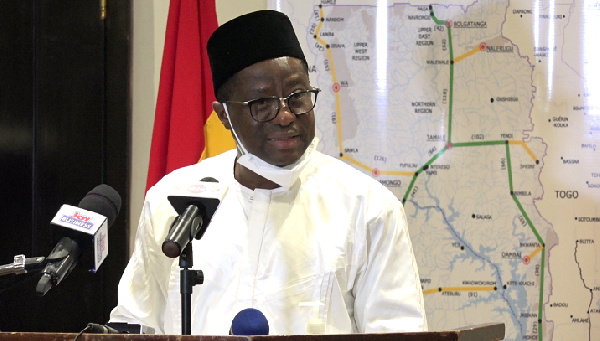
Are we all insane? The mirage of increasing Ghana’s tax efforts

When you misinterpret the performance of the economy, it is just a matter of time before the tax efforts of the economy present counter-narratives.
This will appear to be the case for the managers of the Ghanaian economy over the last decade, a situation which could further worsen by the time the fiscal outturn of 2020 is released in the first quarter of 2021.
The tax effort of an economy – measured by relating the actual tax collections to some credible indicator of taxable capacity usually gross national income at market prices, captures the ‘efforts of the economy to support its subsistence needs’. Thus, the ability of an economy to finance its many needs of development is intrinsically linked to its ability to mobilise domestic tax revenue and improve its tax efforts. Improving the tax efforts is also important in the practice of democracy because it undergirds the social contract between the governed the and government such that, the higher the tax efforts, the more citizens typically expect their governments to deliver on essential needs. It is not surprising therefore that autocratic regimes are usually associated with limited and constrained tax efforts, as these usually depend on alternative revenue sources – commodity revenues, and borrowing, to finance development.
It is against the above that different governments in Ghana have identified the need to increase the tax efforts of the Ghanaian economy. Considering that taxes are function of the performance of the economy, an increase in economic activity should naturally result in an increase in tax revenue in nominal terms. A government’s efforts at mobilizing tax revenue without inflicting hardship on citizens should naturally be seen as the consistent increase in the tax/income ratio of the economy, all factors being equal.
The case of Ghana over the last decade leaves little to be desired in this regard, which has implications for the country’s development and crucially the much-dreaded borrowing and public debt of the economy. Between 2010 and 2016, the tax effort of the economy as shown in figure 1, improved marginally to 19.65 percent from 17.43 percent. The efforts peaked in 2012 at about 21.58 percent before declining in the two fiscal periods after that year ostensibly as a result of the significant pressures exerted on the economy by protracted energy crises, and the collapse of the commodity super-cycle.
When the current government argued ‘we cannot tax ourselves out of poverty’, and suggested the need to ‘shift the structure of the economy from a tax orientation to production driven’, the business community and other players in the economy considered this a desired end. It is against this backdrop that and other such commitments that led to the overwhelming victory of the current government in the 2016 general elections. The NPP government further argued that, as the economy grows, tax revenue will also increase and the tax efforts will increase as a result of numerous tax reforms lined up for implementation between 2017 and 2020. Indeed, the economic management policies of the government since 2017 have at different times justified the expenditure on the digitization efforts that these will ultimately help improve the tax efforts of the economy.
In its 2017 budget and economic management plan, the government through the finance minister Mr. Ken Ofori Atta indicated “special initaitives such as the National Identification Scheme and the National Digital Address System will be implemented as part of measures to formalize the economy to broaden the tax base” and consequently increase the tax efforts of the economy.
In 2018, Mr. Ofori Atta further indicated that “as part of the [government’s] fiscal strategy for the medium term, … it will in addition to empowering the Ghana Revenue Authority (GRA) to improve tax administration, invest in programmes and infrastructure to widen the tax net”, and further clarified that the efforts will include “implementing the National Digital Address System, accelerating the implementation of the National Identification Programme, deployment of Fiscal Electronic Devices to improve VAT declaration and special audits among others”. An additional 4,000 staff through the national service scheme were employed in 2018 to support the digital addressing system implementation. In emphasizing the fiscal action points for the 2018 fiscal year, the Finance Minister did indicate the importance of National Digital Address system, Tax Identification Numbers among others.
The consistency and belief of the government in its digital strategies have been unwavering as in 2019, the finance minister while presenting the economic management plan of government indicated the need to “maximize domestic resource mobilization and increase tax revenue to GDP ratio to levels in line with our peer Lower Middle-Income countries”. The results shown in figure 1 is anything but an increase in tax to GDP ratio. Indeed, this has declined every single year since 2017, which undermines the digital strategies mentioned above. Did the country get value for money from these huge investments in its digital efforts?
These efforts were further intensified in other revenue collection points such as the Ghana Museum and Monuments Board (GMMB), “which launched a digital revenue mobilization strategy to streamline revenue collection and minimize leakages” piloting the project tin Cape Coast and Elmina Castles, with plans to expand to other tourist sites in the country. Having reported in 2019 on 1.3million digital addresses being issued, with 8,000 properties being tagged, one will expect that some gains will subsequently be made, especially when the second phase of the project was to cover 3 million addresses and create jobs for 500 or more revenue agents. Our results are anything but gains in the tax efforts. Is there a misdiagnosis of the problem that is leading to these investments leading to less than desirable results? The ministry of finance and economic planning and the government have not provided a credible explanation to these developments, but rather continued to justify more of such investments. Again in 2019, the minister Ken Ofori Atta suggests that in the country’s effort to achieve SDG 17, it will shore up domestic revenues through the deployment of the National Digital and Property Addressing System, Accelerated National identification Programme, Paperless Port System, Excise Tax Stamp Policy and the Tax Revenue for Economic Enhancement (TREE) Project. The less one averts their mind to the paperless ports system and the mess created with implications for domestic revenue, the better! The government has further engaged 12,000 staff through the Nation Builders Corps (NABCO) programme, to further support the implementation of the National Digital Property Addressing System to ensure we maximize revenue generation. More of such updates have further been provided in the fiscal strategy for 2020, and one can confidently guess the outcome of the efforts, especially when COVID-19 has taken a toll on the economy.
It is more worrying if the accounts of the government on the expansion of the economy is taken into cognizance. It may well be that the economy is expanding in sectors or value chains that are not taxable, which could well mean that these expansions have nothing to do with government policy. It may also be that, the numerous tax reliefs are taking a toll on the economy – something the government was clearly cautioned against by different actors and watchers of the Ghanaian economy.
Our actions appear to validate the saying credited to Albert Einstein that “insanity is doing the same thing over and over again but expecting different results”. Are we all insane? We need to change tact!
By Patrick Stephenson






